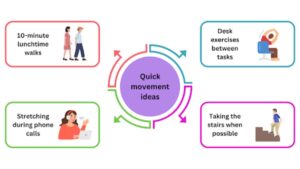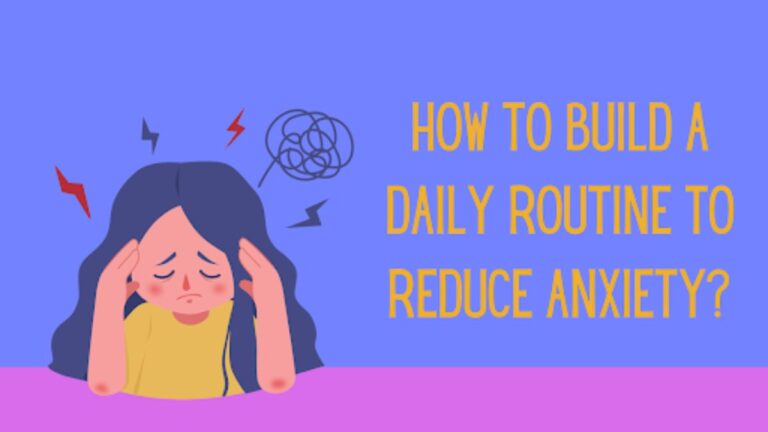Living with anxiety can feel challenging, but having a steady daily routine can truly help. Simple, consistent habits each day bring more stability and calm, helping you feel more in control and at ease. Research shows that structured routines can reduce stress and lift your mood, making it easier to handle daily life.
In this blog, we’ll explore practical ways to create a routine that supports your mental well-being. From a calm morning start to a relaxing evening wind-down, let’s look at simple steps to ease anxiety and add more peace to your day.
Establishing a Purposeful Morning Start
The way you begin your day sets the tone for everything that follows. A thoughtful morning routine can help reduce anxiety symptoms and create a foundation of calm that carries you through the day.
Mindful Beginnings
Start your day with 5-10 minutes of meditation, gentle stretching, or deep breathing exercises. Studies show these practices can reduce anxiety levels among regular practitioners. Choose a quiet space where you won’t be interrupted, and focus on being present in the moment.
Proven techniques to try:
- Box Breathing: Breathe in for a count of 4, hold for 4, breathe out for 4, and hold for 4 again. This breathing rhythm is excellent for calming the mind and grounding your focus.
- Body Scan Meditation: Slowly scan from head to toe, noticing tension points and releasing them. This can help ease physical stress that often goes unnoticed, allowing your body to fully relax.
- Gentle Yoga Poses: Start with simple poses like child’s pose or cat-cow, which release tension from the spine and relax muscles. Combine each pose with slow, controlled breaths to deepen the calming effects.
- Mindful Walking: Take a 5-minute stroll, either outside or around your home. Focus on each step, noticing how your feet touch the ground and how the air feels as you move. This mindful movement helps release physical tension and centers the mind.
By weaving mindfulness into your morning, you’re creating a foundation of calm and control that can make the rest of the day feel more manageable and focused.
Intentional Nutrition
A balanced breakfast isn’t just about satisfying hunger – it’s about nourishing your body and mind. Research indicates that a proper morning meal can improve mood and cognitive function.
Start with whole grains like oatmeal or quinoa for sustained energy. Add protein-rich foods such as eggs or Greek yogurt to stabilize blood sugar. Include fresh fruits or vegetables for essential nutrients. Consider healthy fats like avocado or chia seeds to support brain function.
Limit caffeine intake, as excessive amounts can trigger anxiety. Consider calming herbal teas as an alternative. Prepare breakfast components the night before to minimize morning stress.
Digital Boundaries
People who delay checking digital devices report lower stress levels compared to those who immediately plug in. The urge to check notifications and social media can intensify anxiety by overloading the mind with information before it’s fully awake. By intentionally holding off, you give yourself space to connect with yourself before facing external demands.
Here’s how to create a digital-free morning that truly supports your mental well-being:
- Keep Devices Out of Reach: Store your phone outside the bedroom to reduce the temptation of checking it immediately. Use a traditional alarm clock to avoid relying on your phone to wake up. This simple change alone can create a clear boundary between the rest and the digital world.
- Start with Soothing Alternatives: Instead of reaching for your phone, try listening to a calming morning playlist, nature sounds, or even an audiobook. These alternatives can offer a peaceful atmosphere that aligns with your goals for a mindful morning.
Set these boundaries for a calmer start:
- Wait 30 minutes before checking messages
- Create a morning playlist instead of scrolling
- Set specific times for email and notifications
- Use app limits to prevent unconscious scrolling
Designing a Midday Reset for Stability
Scheduled Breaks
Taking short breaks every 90 minutes can reduce stress levels by 25%. Make these breaks count with purposeful activities:
Practice desk stretches or quick breathing exercises. Stand up and walk around your space. Two minutes of conscious movement can reset your nervous system. Listen to calming music or nature sounds during these pauses.
Movement and Hydration
Movement and hydration work together to manage anxiety effectively. Studies show proper hydration improves mood, while regular movement decreases anxiety.

Keep water easily accessible. Set simple reminders to drink throughout the day. Track your intake with a water bottle marked with time goals.
Gratitude Practice
A midday gratitude check-in shifts focus from worry to appreciation. Just 5 minutes of gratitude journaling leads to an increase in well-being. Here’s how to make it effective:
Write about three specific moments that brought you joy today. Describe a positive interaction you’ve experienced. Record a small win or accomplishment. The key is being specific rather than generic in your appreciation.
Seeking Support from an Anxiety Treatment Center
If you’re finding anxiety challenging to manage, reaching out to an Anxiety Treatment Center can provide the support you need. These centers offer specialized programs that help individuals cope with anxiety and equip them with tools to lead more balanced, peaceful lives.
Anchoring the Evening with Wind-Down Routines
Relaxation Techniques
Progressive muscle relaxation and mindfulness exercises can reduce anxiety levels in a single session. Create a calming environment by dimming lights and finding a quiet space.
Follow this simple sequence:
- Gentle neck and shoulder rolls
- Progressive muscle relaxation
- Deep breathing exercises
- Mindful body scanning
Add soft background music or nature sounds to enhance relaxation. Consider using calming scents like lavender or chamomile.
Digital and Mental Detox
Create a technology-free window before bed. Research shows this approach improves sleep quality by 50%, directly impacting anxiety levels.
Your evening sanctuary should include:
- A 1-2 hour screen-free period
- Dimmed lights to signal bedtime
- Calming activities like reading
- Gentle stretching or yoga
Keep your bedroom cool, quiet, and free from work-related items. Use this time to transition mentally from day to night.
Setting Intentions for a Peaceful Tomorrow
Spend 10 minutes planning tomorrow to reduce uncertainty. This simple practice reduces anxiety by 30% by creating a sense of control.
Write down:
- Three main priorities
- Important appointment times
- Self-care moments to schedule
Prepare for tomorrow by laying out clothes and packing essentials. This reduces morning stress and helps you feel more organized.
How Simple Habits Lead to a Calmer Mind
Creating a daily routine that eases anxiety is a powerful way to build mental resilience and stability. Each element, from a focused morning start to an evening wind-down, helps regulate your body and mind, supporting a sense of calm.
Routines can reduce stress by providing a predictable structure that can ground you, especially during uncertain times. By committing to practices like mindfulness, intentional breaks, and digital boundaries, you’ll be better equipped to face daily challenges with clarity and confidence.
It’s important to remember that routines are not about perfection but about finding consistency that brings you peace.
If you miss a day, simply pick up where you left off building resilience is a gradual process. By taking small, intentional steps toward a supportive routine, you’re investing in your mental well-being and creating a life where you feel more balanced and empowered every day.
Frequently Asked Questions
How long does it take to see anxiety reduction from a routine?
Many people start noticing a reduction in anxiety within 2–4 weeks of consistent routine practice. However, progress varies based on individual factors, so patience and regularity are essential.
What should I do if I miss a day in my routine?
Missing a day is normal. Simply pick up where you left off the next day without self-criticism. Flexibility and self-compassion are crucial for making your routine sustainable and beneficial.
Are there specific activities best suited for mornings or evenings?
Energizing activities, like exercise or meditation, are ideal for mornings, helping you start the day focused. In the evening, calming practices, such as gentle stretching or journaling, support relaxation and better sleep.

